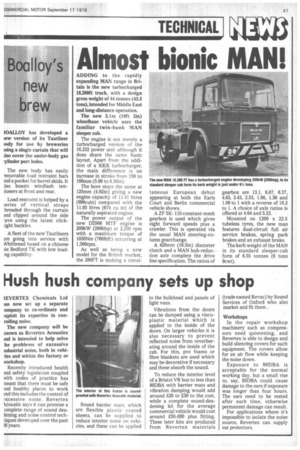Hush hush company sets up shop
Page 49

If you've noticed an error in this article please click here to report it so we can fix it.
tEVERTEX Chemicals Ltd tas now set up a separate :ornpany to co-ordinate and txploit its expertise in conrolling noise.
The new company will be mown as Revertex Acoustics tnd is intended to help solve he problems of excessive ndustrial noise, both in vehi:les and within the factory or workshop.
Recently introduced health ind safety legislation coupled with codes of practice has neant that there must be safe Ind healthy places to work ind this includes the control of xcessive noise. Revertex kcoustic says it can promise a :omplete range of sound dealening and noise control techiiques developed over the past !O years. Sound barrier mats, which are flexible plastic coated sheets, can be supplied to reduce interior noise on vehicles, and these can be applied to the bulkhead and panels of light vans.
Vibrations from the doors can be damped using a viscoplastic material which is applied to the inside of the doors. On larger vehicles it is also necessary to prevent reflected noise from reverberating around the inside of the cab. For this, pvc foams or fibre blankets are used which may be decorative if necessary and these absorb the sound.
To reduce the interior level of a Bristol VR bus to less than 80DBA with barrier mats and vibration damping would add around £20 to £30 to the .cost, while a complete sound-deadening kit for the average commercial vehicle would cost around £50-£60 plus fitting. These later kits are produced from Revertex materials (trade named Revac) by Sound Services of Oxford who also market and fit them Workshops In the repair workshop machinery such as compressors need quietening, and Revertex is able to design and build silencing covers for such equipment. The covers allow for an air flow while keeping the noise down.
Exposure to 90DBA is acceptable for the normal working day, but a small rise to, say, 93DBA could cause damage to the ears if exposure was longer than four hours. The ears need to be rested after such time, otherwise permanent damage can result.
For applications where it's impossible to isolate the noise• source, Revertex can supply ear protectors.








































































































































































































